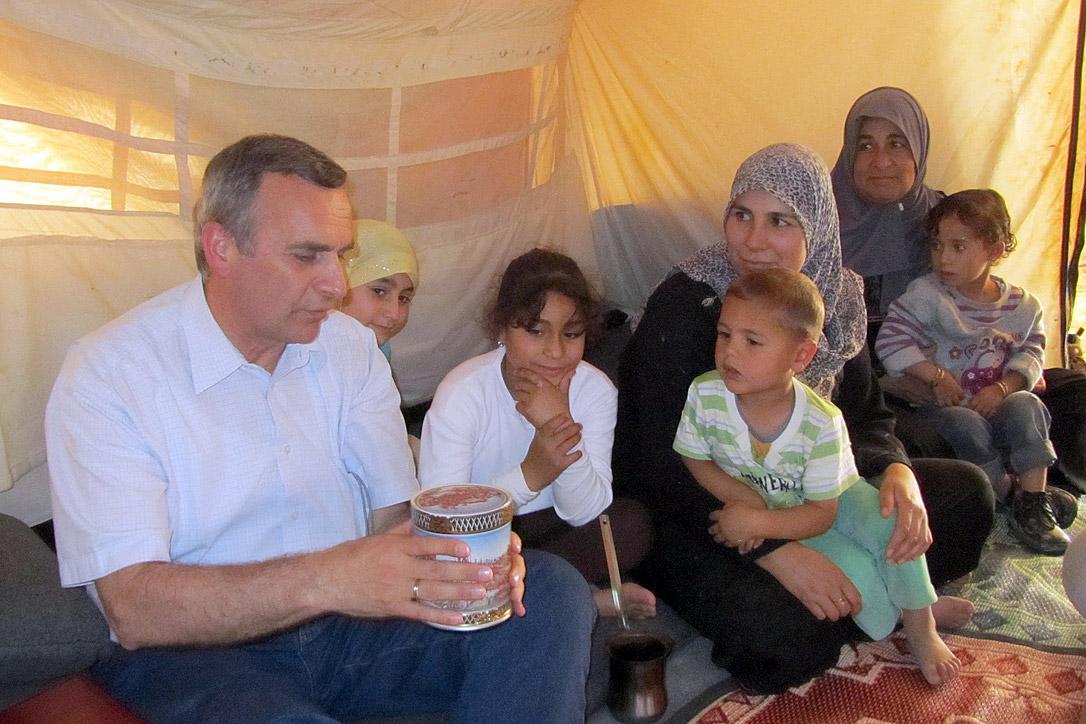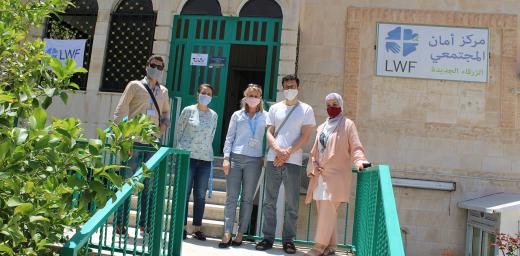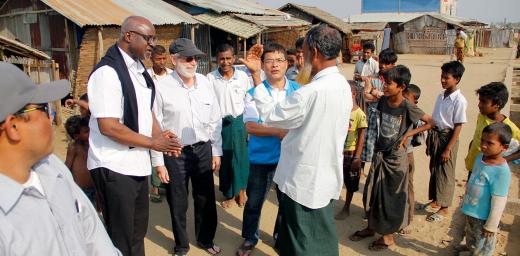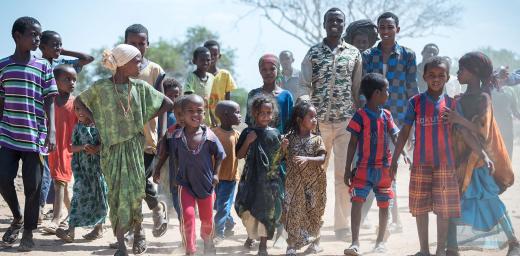LWF Intervention in Jordan Engages Syrian Refugees in Peace Building

Rev. Michael Martin shares a tin of sweets with a Syrian family at the Zaâatri refugee camp. Photo: LWF Jordan/E. Gano
Interview with Bavarian Delegation Visiting Za’atri Camp and Al Mafraq Communities
(LWI) – The Lutheran World Federation (LWF) continues assistance to Syrian refugees in Jordan through initiatives for peace building and reconciliation in Za’atri camp, and social cohesion and economic empowerment activities among the host communities. Such intervention is made possible by strong support from LWF’s partners including the Evangelical Lutheran Church in Bavaria (ELKB), Germany.
In May, Rev. Michael Martin, ELKB director for ecumenism and church life led a delegation to Za’atri refugee camp and Al Mafraq in the north, where the LWF is assisting both Syrians and Jordanians in a context of interfaith collaboration between Christians and Muslims. In this interview with Lutheran World Information (LWI), Martin shares impressions about LWF’s work in Jordan.
LWI: Since the LWF began assisting Syrian refugees in Jordan, ELKB has maintained its strong support. What is the rationale for your assistance to refugees in the camp and in the host communities?
Firstly, ELKB works in a two-pronged approach:
Inside Germany, our social service (diakonia) work includes support to migrants coming from Syria. We promote the peaceful integration of refugees into Bavarian society.
We are also engaged in ecumenical cooperation globally. As part of our support to Syrian refugees, our partners in Lebanon include CAPNI (Christian Aid Program Northern Iraq) and the foundation “Wings of Hope,” which is specialized in trauma therapy and working in a refugee camp near Dohuk northern Iraq. Therefore, there is a connection between our support to refugees in Iraq and LWF’s intervention in Za’atri refugee camp. Father Emmanuel Youkhana from the Apostolic Church of the East (Assyrian Church) joined us on the visit in order to provide a comparative analysis of the situation and approach.
The ELKB partnership with the LWF goes back to LWF’s founding—more than 65 years. We have continued to strengthen these links around the world by supporting LWF’s emergency work. We wanted to intervene and help Syrian refugees in neighboring countries. LWF (World Service) is the only humanitarian organization in the Lutheran communion family working in Jordan, and we feel very much attached to your work there. We have had good experiences with the emergency response mechanisms through the ACT appeals and the associated reporting, which all resonate well with our strategy for global humanitarian response.
What was your perception of the psychosocial and trauma counseling work that the LWF is providing in the camps and the support to host communities?
First of all, what the LWF is doing at Za’atri camp falls in the first level of community-based psychosocial support: involving group approach, and not trauma counseling which would imply a one-on-one approach.
LWF works in the area of non-violent communication, and through the “Peace Oasis” project (inside Za’atri) offers a unique setting as the only agency in the camp that is providing this kind of service for Syrian refugees. This project comprises group sessions which offer free space for learning among boys and girls (organized in separate groups); opportunities for young people in different age groups to exercise the capacity to express their emotions; activities to engage with one’s neighbors in a non-violent way; space to become more balanced emotionally, and to engage actively in peace building, conflict mitigation and reconciliation. We appreciate this approach, and found it very relevant for the context.
The Peace Oasis project also relates to other aspects of LWF’s work among the refugees and their hosts, including sports facilities at the refugee camp. There is also a strong connection to the economic empowerment project in Al Mafraq that engages the refugees and host communities in preparing meals for groups in a communal kitchen operated by Syrian and Jordanian women, as well other income-generating activities. Such approaches single out the relevance and importance of LWF’s work.
Overall, what are your impressions about the quality of services the LWF is providing to the refugees in the host communities and in the camp?
The quality of services is high, and we appreciate the way the work is implemented. For example, we learned that Ms Wejdan Jarrah, team leader of the Peace Oasis project and other staff members train qualified Syrian refugees to conduct the peace-building training sessions among the refugees. This is an important approach in working with the refugees.
We left Jordan with a strong affirmation of ELKB’s commitment to continue supporting LWF’s humanitarian intervention as necessary. What we saw encouraged us further and we are looking into possibilities of facilitating technical exchanges between staff of the Peace Oasis project and CAPNI in Iraq, our partner for 20 years, in order to learn from each other.
We have also observed very good team work, constructive and flat hierarchies and good communication—which facilitate the successful implementation of a demanding, program in challenging circumstances.
(Kirchenrat Thomas Prieto Peral, ELKB coordinator for ecumenism, migrants and development, and Fr Emmanuel Youkhana accompanied Rev. Michael Martin on the 8-9 May visit to the LWF program in Jordan.)





